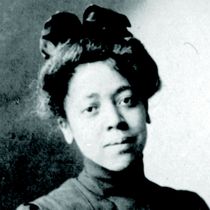The child who would become Denver, Colorado’s first and only woman doctor in the early decades of the twentieth century was born in Knoxville, Illinois on January 22, 1871. Her mother, Melisia Warren, had acted as a practical nurse to other slaves and sustained the family with her practice in their Illinois neighborhood. Justina accompanied her mother on her neighborhood rounds and from an early age aspired to become a doctor. Her mother supported this dream and other family members helped her financially when she enrolled in Chicago’s Hering Medical College, a school for homeopathic medicine. Justina married the Rev. Dr. John Elijah Ford in 1892 while still in school. On graduating in 1899, Justina set up practice in Chicago, but her husband was called to Denver’s Zion Baptist Church in 1900 and Justina followed him in 1902.
Census records for 1910, 1920, and 1930, show that she was Denver’s only female doctor. As both a woman and an African American she was initially denied a medical license. After receiving her license, area hospitals denied her and her patients access. She was also denied membership in the Denver Medical Society, the Colorado Medical Society, and the American Medical Association. Because she did not have hospital privileges, Dr. Ford specialized in general medicine and treated people either in her office or in their homes. The majority of patients came to her for checkups, minor illness, and obstetrical care. Late in life she estimated that she had delivered some 7,000 babies during her fifty-year career.
When Dr. Ford died in 1952, she was widely known to patients of every race and religion. She learned several different languages, enabling her to communicate with patients in their native tongue, and her generosity was legendary. Dr. Ford never pressed families for payment and often bought food or coal for those who could not afford it. Although she has been gone for over fifty years, the community has ensured that her memory remains alive. The Colorado Women’s Hall of Fame inducted her in 1985, the Colorado Medical Society designated her a medical pioneer in 1989, and in 1984 her Arapaho Street house and home office, scheduled for demolition by the city, was moved to its current location on California Street where it serves as the home of the Black American West Museum & Heritage Center. A bronze sculpture stands across the street in memory to her dedicated community service.

